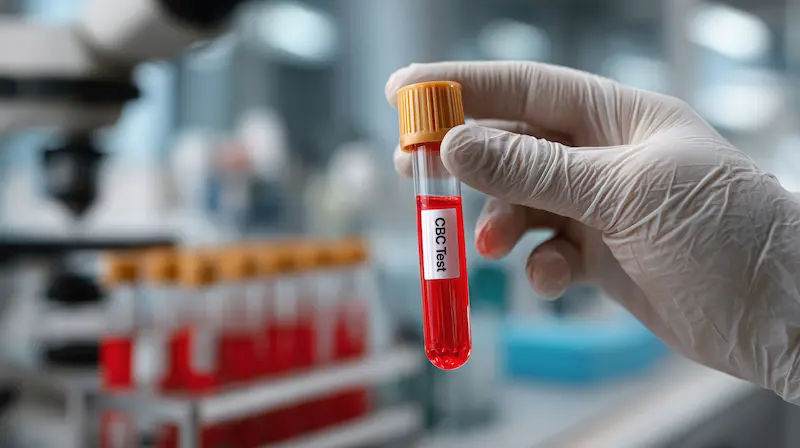Guide to Complete Blood Count (CBC) Test
Understand the Complete Blood Count (CBC) test. Learn what red and white blood cells, hemoglobin, and platelets indicate, and what abnormal results mean for your health. Read the full guide now.

Written by Dr. Siri Nallapu
Reviewed by Dr. D Bhanu Prakash MBBS, AFIH, Advanced certificate in critical care medicine, Fellowship in critical care medicine
Last updated on 27th Oct, 2025
%20Test.webp?tr=q-80,f-webp,w-350,dpr-2,c-at_max 700w)
Introduction
Whether you’re doing a routine health check or investigating symptoms like fatigue, infections, or easy bruising, the complete blood count test (CBC) is often the first step. This simple blood test measures your red cells, white cells, and platelets—the three essential “lines” that keep oxygen flowing, fight infections, and manage clotting. Because the CBC is widely available, quick, and affordable, it’s one of the most common tests your clinician will order to screen your overall health, detect issues early, and guide next steps.
In this practical guide, you’ll learn exactly what the complete blood count test includes, how to prepare, and how to understand your numbers without getting overwhelmed. We’ll explain what high or low results can mean in real life, when to repeat the test, and which follow-up labs might be suggested. You’ll also pick up insider tips on factors that can skew results—like hydration, altitude, or medications—so you can interpret your CBC confidently and discuss it effectively with your doctor. If lab work is recommended, we’ll also point out convenient home collection options to make testing easier.
What is a Complete Blood Count (CBC) Test?
A quick definition in plain language
A complete blood count test (CBC) is a snapshot of your blood’s key components: red blood cells that carry oxygen, white blood cells that fight infection, and platelets that help your blood clot. It also includes helpful indices that describe the size and hemoglobin content of your red cells, which can point toward specific types of anemia. Clinicians order it because it’s fast, informative, and can uncover silent issues before symptoms surface
Why CBC is a foundational blood test?
The CBC serves multiple roles:
• Screening: It can catch anemia, infections, or platelet issues even if you feel fine.
• Diagnosis: Together with your symptoms and history, it helps narrow potential causes (e.g., iron deficiency vs. B12 deficiency).
• Monitoring: If you’re on medications that affect the bone marrow, undergoing chemotherapy, or recovering from an illness, trending CBC values helps track your progress.
When doctors typically order it?
• Routine checkups or preoperative assessments
• New symptoms: fatigue, fever, bleeding, bruising, recurrent infections
• Monitoring chronic diseases or medications (e.g., some antibiotics, seizure meds, immunosuppressants)
• Pregnancy: as part of prenatal care
• Follow-up after abnormal results or treatment changesConsult a Top General Physician
What Does a CBC Measure?
White blood cells (WBC) and the differential
• Total WBC: Overall immune cell count. A “differential” breaks this down into neutrophils, lymphocytes, monocytes, eosinophils, and basophils.
• Why it matters: High WBC may indicate infection, inflammation, stress, or certain blood disorders; low WBC can suggest viral infections, medication effects, or bone marrow issues .
Red blood cells (RBC), hemoglobin (Hgb), hematocrit (Hct)
• RBC count: Number of red cells per volume.
• Hemoglobin: The oxygen-carrying protein; a central marker for anemia.
• Hematocrit: Percentage of blood composed of red cells, influenced by hydration status.
These values rise with dehydration or high altitude and fall in anemia or after blood loss.
Red cell indices: MCV, MCH, MCHC, RDW explained
• MCV (mean corpuscular volume): Average size of RBCs; low in iron deficiency, high in B12/folate deficiency.
• MCH/MCHC: How much hemoglobin is inside red cells and how concentrated it is.
• RDW (red cell distribution width): Variation in RBC size; higher RDW can suggest mixed deficiencies or evolving anemia.
Platelets (PLT) and MPV
• Platelets: Essential for blood clotting; too few can increase bleeding risk; too many can raise clot risk.
• MPV (mean platelet volume): Average platelet size; can hint at how actively the marrow is producing platelets.
Why and When You Might Need a CBC?
Routine checkups vs. symptom-driven testing
A CBC is commonly included in annual checkups or health screenings. It provides baseline values and can detect asymptomatic anemia or subtle immune changes. Symptom-driven testing often targets concerns like fatigue, pallor, shortness of breath, frequent infections, fevers, or unusual bruising. For example, someone with persistent fatigue and pale skin might have a low hemoglobin level suggesting iron deficiency, which the CBC can flag early [2][6].
Monitoring chronic conditions, medications, or chemotherapy
If you live with chronic kidney disease, inflammatory illnesses, or autoimmune conditions, or you’re taking medicines known to suppress bone marrow, your clinician may schedule periodic CBCs to ensure your counts remain stable. In cancer care, the CBC helps guide timing of chemotherapy cycles and supportive treatments. A falling neutrophil count (neutropenia) may prompt infection precautions or dose adjustments.
Special situations: pregnancy, before surgery, infections, bleeding
• Pregnancy: Hemodilution in mid-pregnancy can lower hemoglobin/hematocrit; clinicians monitor for iron deficiency and overall trends.
• Preoperative: Identifies anemia or platelet problems before surgery to reduce risks.
• Acute infections: WBC and differential can support a diagnosis (e.g., neutrophilia in bacterial infections; lymphocytosis sometimes in viral infections).
• Bleeding episodes: CBC can quantify blood loss impact and need for further evaluation.
Unique insight: Ask for a copy of your CBC to build a personal baseline. Comparing future tests to your own normal range can be more informative than comparing population ranges alone.
How to Prepare and What to Expect?
Do you need fasting for a CBC?
• Generally, no fasting is required for a complete blood count test. If your clinician adds other tests (like a lipid panel), fasting may be requested. Always check your test order or message your provider to confirm [2][4]. Hydration matters: drinking water before your draw can make the venipuncture easier and reduce hemoconcentration that can mildly alter Hct or Hgb.
The blood draw step-by-step and common risks
• A tourniquet is applied, skin is cleaned, and a small needle draws blood into tubes.
• The process takes a few minutes; many feel only a brief pinch.
• Risks are minimal: mild bruising or tenderness at the puncture site. Serious complications are very rare.
• If you’re prone to fainting, let the phlebotomist know—drawing in a reclined position helps.
Home collection and convenience options (including Apollo 24|7)
• If getting to a lab is challenging, home collection services can be a game-changer. In many cities, trained phlebotomists can visit your home to collect samples for a CBC and other common labs. Apollo 24|7 offers a convenient home collection for tests like CBC, vitamin D, and HbA1c—useful for busy schedules or mobility concerns.
Tips to reduce discomfort or anxiety
Hydrate well and keep your arm warm before the draw.
Practice slow, deep breathing or brief distraction techniques.
If you’ve had difficult draws before, mention which arm or vein worked best.
Reading Your Results: Normal Ranges and What High/Low Means
Typical adult ranges (and why “normal” can vary by lab)
Reference intervals vary slightly by laboratory and population. Typical adult ranges often cited include:
• WBC: ~4,000–11,000 cells/µL
• Hemoglobin: ~13.5–17.5 g/dL (men), ~12.0–15.5 g/dL (women)
• Hematocrit: ~41–53% (men), ~36–46% (women)
• Platelets: ~150,000–450,000/µL
• MCV: ~80–100 fL
Ranges can differ for children and during pregnancy. Always interpret your CBC using your lab’s reference range and clinical context.
WBC high/low: infection, inflammation, meds
• High WBC (leukocytosis): common in bacterial infections, inflammation, stress, smoking, steroid use; rarely due to blood cancers.
• Low WBC (leukopenia): viral infections, medications (e.g., chemotherapy), autoimmune conditions, marrow disorders. A differential helps pinpoint which WBC subtype is affected .
Hemoglobin/hematocrit high/low: anemia types, dehydration, altitude
• Low Hgb/Hct (anemia): iron deficiency, B12/folate deficiency, chronic disease, kidney disease, blood loss. MCV guides the next step (low MCV suggests iron deficiency; high suggests B12/folate deficiency).
• High Hgb/Hct: dehydration, living at high altitude, smoking, or rarer conditions like polycythemia vera.
• Pro tip: If you were dehydrated at the time of the test, rehydration and a repeat CBC can clarify borderline high Hct.
Platelets high/low: bleeding risk, clotting risk
• Low platelets (thrombocytopenia): bleeding, bruising, tiny red spots (petechiae). Causes include infections, medications, immune thrombocytopenia, bone marrow disorders.
• High platelets (thrombocytosis): reactive (inflammation, iron deficiency, postsurgical) or clonal (myeloproliferative disorders). Your clinician may correlate with symptoms and other labs.
How age, sex, pregnancy, and menstruation influence ranges?
• Children: Normal ranges change with age; pediatric-specific charts are used.
• Women: Menstruation can temporarily lower hemoglobin; pregnancy typically lowers Hgb/Hct due to plasma volume expansion.
• Older adults: Slight shifts in reference intervals may occur; trends and symptoms guide interpretation
Conditions a CBC Can Help Detect or Monitor
Anemias (iron deficiency, B12/folate, chronic disease, hemolysis)
• Iron deficiency anemia: Low Hgb/Hct, low MCV (microcytosis), high RDW; often due to blood loss or low iron intake. Next steps: ferritin, iron, TIBC.
• B12/folate deficiency: Low Hgb/Hct, high MCV (macrocytosis); next steps: vitamin B12, folate, possibly methylmalonic acid.
• Chronic disease anemia: Normal to low MCV, often mild; tied to inflammation or chronic illness.
• Hemolysis: Anemia with high reticulocyte count; may show elevated LDH and bilirubin .
Infections and inflammation
• Acute bacterial infections often elevate total WBC, especially neutrophils; severe infections can drop counts if the marrow is overwhelmed.
• Viral infections may lower WBC with relative lymphocytosis.
• Chronic inflammation can mildly affect RBC and platelet counts.
Blood cancers and bone marrow disorders
• Markedly abnormal WBCs, very high or low platelet counts, or persistent unexplained anemia can prompt evaluation for leukemias, lymphomas, or myeloproliferative disorders. A peripheral smear, flow cytometry, or bone marrow biopsy may be considered next.
Bleeding and clotting disorders
• Low platelets or poor platelet function can cause bruising and prolonged bleeding. High platelets may increase clot risk. CBC findings guide further tests like PT/INR, aPTT, or specialized platelet function assays.
Real-world mini-cases to illustrate patterns
• Case 1: A marathon trainee with fatigue shows low Hgb, low MCV, and high RDW—classic iron deficiency likely from increased demand and dietary gaps; iron studies confirm.
• Case 2: A patient on chemotherapy has a low neutrophil count; treatment is delayed and infection precautions instituted; counts recover on follow-up CBC.
• Case 3: A young adult with sore throat has elevated WBC with lymphocytosis; clinician suspects viral illness and avoids unnecessary antibiotics.
If symptoms persist beyond two weeks or you’re worried by your results, consult a doctor online with Apollo 24|7 for further evaluation.
What Happens Next?: Follow-Up Tests and Conversations
Common follow-up labs
• Iron panel (ferritin, iron, TIBC) for microcytic anemia
• Vitamin B12, folate, and sometimes methylmalonic acid for macrocytic anemia
• Reticulocyte count to gauge marrow response
• Inflammation markers: CRP, ESR
• Hemolysis labs: bilirubin, LDH, haptoglobin
• Thyroid tests if unexplained anemia persists
Peripheral smear and when imaging or bone marrow tests are considered
A manual blood film (peripheral smear) lets specialists look at cell shape and maturity—crucial when counts are extremely abnormal or when blasts or schistocytes are suspected. Imaging or bone marrow exams are reserved for persistent, unexplained abnormalities or when cancers are suspected.
When to seek medical help and how to prepare for your appointment?
Seek timely care if you have:
• Severe fatigue, chest pain, shortness of breath, fainting
• Fever with very low WBC/neutrophils
• Easy bruising, nosebleeds, or bleeding that won’t stop
Bring to your visit:
• A list of medications and supplements
• Your previous CBCs to compare trends
• Specific questions (e.g., “Do I need iron studies?” “When should I repeat the CBC?”)
If your condition does not improve after trying initial recommendations or if your CBC remains abnormal, book a physical visit to a doctor with Apollo 24|7.
Factors That Can Skew Results? (and How to Avoid Misreadings)
Hydration, hemoconcentration, and recent exercise
Dehydration concentrates the blood and can nudge hematocrit and hemoglobin upward; vigorous exercise can transiently shift WBC counts. Hydrate normally and avoid intense workouts immediately before a draw when possible.
Altitude, smoking, medications
High altitude and smoking can increase hemoglobin; certain medications (steroids, lithium, clozapine, some antibiotics, chemo) can push WBCs or platelets up or down. Always share medication and travel histories with your clinician.
Timing: morning vs. afternoon draws
Circadian rhythms and meals have modest effects on some parameters. Consistency—same time of day, similar hydration—improves comparability when following trends.
Why trends over time matter more than one-off values?
Single results can be outliers. Tracking your counts over weeks to months paints a truer picture, especially if you’re adjusting medications, treating deficiencies, or recovering from illness. Ask your provider when to repeat a CBC after an abnormal result—often 2–6 weeks depending on the issue.
Cost, Access, and Practical Tips
Typical costs and insurance notes
CBCs are generally inexpensive and commonly covered by insurance when medically indicated. Prices vary by location and whether additional tests are bundled (e.g., “CBC with differential”). If you’re paying out-of-pocket, ask the lab for a cash price.
Saving time with scheduling and home collection
• Schedule during off-peak hours to avoid waits.
• Consider home collection services. Apollo 24|7 offers home collection for CBC and other panels so you can test without taking time off work.
How to store and share your reports securely?
Keep digital copies in a secure health folder.
Track trends in a simple spreadsheet or health app.
Share reports with all your providers, especially if you see multiple specialists.
Consult a Top General Physician
Conclusion
The complete blood count test is one of the most valuable, versatile tools in modern healthcare. In minutes, it offers a close look at your red blood cells, white blood cells, and platelets—key players that deliver oxygen, fight infection, and control bleeding. Whether your clinician is screening for issues during a routine check, evaluating symptoms like fatigue or fever, or monitoring treatment, the CBC provides actionable information that can guide the next steps.
Remember that numbers live in context. Hydration, altitude, medications, pregnancy, and timing can all nudge results. That’s why trends over time, combined with your story and exam, are far more telling than any single value. If something looks off, it often takes a short list of follow-up labs—like ferritin, B12, or a reticulocyte count—to pinpoint the cause and get you on the right treatment path.
Consult a Top General Physician

Dr. Chaithra H
General Physician/ Internal Medicine Specialist
6 Years • MBBS, MD General Medicine, DNB General Medicine
Bangalore
Apollo 24|7 Clinic - Karnataka, Bangalore

Dr. M L Ezhilarasan
General Practitioner
6 Years • MBBS
Visakhapatnam
Apollo 24|7 Clinic - Andhra Pradesh, Visakhapatnam

Dr. Siri Nallapu
General Practitioner
5 Years • MBBS
Hyderabad
Apollo 24|7 Clinic, Hyderabad

Dr D M Karthik
General Practitioner
4 Years • MBBS, Fellowship in Diabetes Mellitus, Advance certificate in Diabetes Mellitus, Derma Nutrition Certification
Visakhapatnam
Apollo 24|7 Clinic - Andhra Pradesh, Visakhapatnam

Dr Divya Lekha Gunta
General Practitioner
10 Years • MBBS, MD (Pathology)
Visakhapatnam
Apollo 24|7 Clinic - Andhra Pradesh, Visakhapatnam
Consult a Top General Physician

Dr. Chaithra H
General Physician/ Internal Medicine Specialist
6 Years • MBBS, MD General Medicine, DNB General Medicine
Bangalore
Apollo 24|7 Clinic - Karnataka, Bangalore

Dr. M L Ezhilarasan
General Practitioner
6 Years • MBBS
Visakhapatnam
Apollo 24|7 Clinic - Andhra Pradesh, Visakhapatnam

Dr. Siri Nallapu
General Practitioner
5 Years • MBBS
Hyderabad
Apollo 24|7 Clinic, Hyderabad

Dr D M Karthik
General Practitioner
4 Years • MBBS, Fellowship in Diabetes Mellitus, Advance certificate in Diabetes Mellitus, Derma Nutrition Certification
Visakhapatnam
Apollo 24|7 Clinic - Andhra Pradesh, Visakhapatnam

Dr Divya Lekha Gunta
General Practitioner
10 Years • MBBS, MD (Pathology)
Visakhapatnam
Apollo 24|7 Clinic - Andhra Pradesh, Visakhapatnam
Frequently Asked Questions
1) Do I need to fast before a complete blood count test?
No fasting is usually required for a CBC test. If other labs (like a lipid panel) are ordered with it, your provider may ask you to fast.
2) What does a high white blood cell count mean?
A high WBC count often points to infection, inflammation, stress, or steroid use; rarely, it can indicate a bone marrow disorder. Your clinician will interpret it alongside symptoms and the differential.
3) How do I know if my low hemoglobin is from iron deficiency or B12 deficiency?
The MCV, RDW, and follow-up tests help. Low MCV often suggests iron deficiency; high MCV suggests B12/folate deficiency. Iron studies and B12/folate levels confirm the cause.
4) Can dehydration affect CBC results?
Yes. Dehydration can concentrate the blood and make hemoglobin and hematocrit appear higher. Hydrate normally before your draw for consistent results.
5) How soon should I repeat a CBC after an abnormal result?
It depends on the context. Many clinicians repeat in 2–6 weeks to confirm if an abnormality is persistent or resolving. Ask your provider for a tailored plan. If symptoms continue, consult a doctor online with Apollo 24|7 for further evaluation.
.webp)



